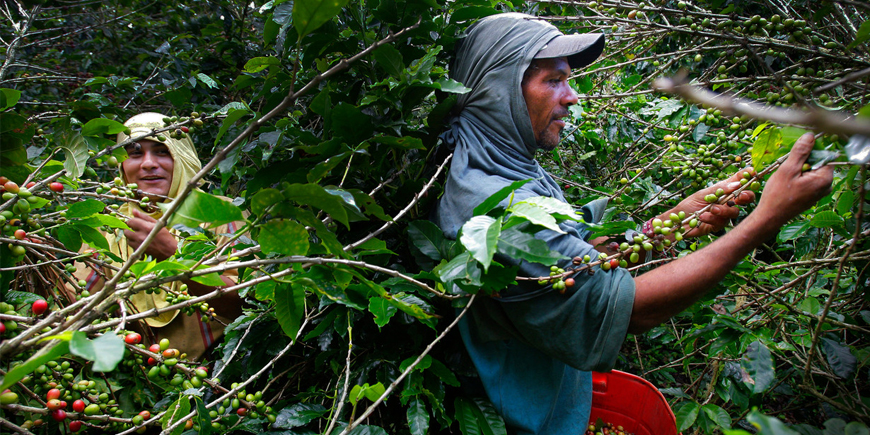- Free shipping in NL from €45
- Order before 12 PM, shipped same business day
- International shipping

Coffee farmers feel exploited and fear ruin

Source: Trouw / ANP
Taste continues to drive us but the position of coffee farmers also remains urgent - happiness through taste but deepen or broaden your happiness with this article from Trouw.
Worldwide, coffee farmers are in dire straits due to low yields from the sale of their coffee beans. The sector is threatened with extinction, the farmers themselves fear.
It is time for multinationals to close the "terribly large financial gap" with coffee farmers, Colombian President Iván Duque said recently. He was responding to the demonstration by dozens of coffee farmers last week in Colombia's capital Bogota. Right in front of the local branch of coffee giant Starbucks, they were protesting against large multinationals that buy their beans for a trifle and, for now, refuse to pay more.
Last Tuesday was International Coffee Day, when the daily cup of coffee is universally celebrated. But there is no celebration right now. In fact, the industry is not doing well at all. Worldwide, coffee farmers now sell their beans for a market price of $1 per pound (about 450 grams), compared with $2.40 per unit five years ago. In the last 15 years, the market price has not been this low.
Negotiating yourself does not workAccording to
the fair trade organization, the Max Havelaar Foundation, farmers need at least $1.40 per unit to recoup production costs at all. This is an average amount used internationally as a standard. Coffee beans are grown primarily in Vietnam, in the South American countries of Brazil and Colombia, and in parts of Africa, such as Kenya and Ethiopia.
For the farmers themselves, negotiating the prices of their beans is an impossible task, observes Tara Scally of Max Havelaar. They often have no idea what amounts they can ask for. Multinationals also take advantage of farmers' weak negotiating position, says Scally. "Middlemen from large coffee companies knock on the farmers' door precisely when they are vulnerable and in urgent need of money. If beans are sold for little money, the whole sector suffers.
"
In addition, coffee is traded in dollars, while coffee-producing countries have a different currency. Brazil accounts for about 30 percent of coffee production, but the value of the national currency real has plummeted in recent years. The low value of the real automatically means low coffee prices, which the entire industry feels.
Mourning bands toIn
any case, Colombian farmers are more than fed up with the meager prices for their beans. In Bogota, demonstrators shouted for help with banners and T-shirts with protest texts such as "Multinationals are starving us. The mourning bands around the farmers' arms symbolized their fear that the sector is doomed.
And that's not a crazy thought, Scally argues. After all, coffee farmers face more problems, such as climate change. Farmers in Africa have seen the quality of their beans decline for a long time due to warming and unpredictable rainfall in the country. And in Asia, more and more coffee plantations are struggling with coffee rust, a fungus in the plants that comes from the changing climate. In fact, coffee farmers are increasingly having to make do with completely failed harvests. That doesn't strengthen their bargaining power either.
Young people have no appetite for the plantationsIn addition,
a problematic shortage of coffee farmers does not seem to be long in coming. The average age of coffee farmers is now 60. In the largest coffee-producing countries, the average life expectancy is relatively low, making 60 extra old. "Young people show no interest in an industry that costs money instead of making money. But the knowledge and maintenance of plantations are lost that way," Scally warns.
In contrast, the prices consumers in restaurants, supermarkets and coffee shops pay for their coffee are not going down. Max Havelaar is organizing a coffee strike Oct. 15, calling on people not to drink coffee for a day in solidarity with farmers.
-
Horecava - Jan. 13 to 16 - RAI Amsterdam Jan 9, 2025
-
Cold autumn days, warm up with good coffee Nov 13, 2024
-
Vacancy Trainer Workshops Nov 12, 2024
- horecava
- rai
- coffee concepts
- sca national coffee competitions
- cup probes
- barend
- boat
- latte art
- dutch brewers cup
- panama kotowa duncan
- filter coffee recipe
- hario switch
- 2025
- coffee
- state
- hospitality
- entrepreneur
- Specialty Coffee Association
- SCA
- Coffee Concepts
- arabica
- quality
- flavor
- autumn
- intense
- java
- indonesia
- espresso
- warm tastes
- coffee experience
- speculoos show
- coffee autumn
- specialty coffee
- coffee moment
- coffee enjoyment
- artisanal coffee
- coffee inspiration
- boat coffee
- barista trainer
- coffee professional
- give workshops
- coffee tasting
- Boot Koffie
- Amersfoort
- sustainable coffee
- hospitality support
- passion for coffee
- geisha
- gesha
- coffee type
- ethiopia
- panama
- colombia
- willemboot
- famous
- Ethiopian coffee
- panamanian coffee
- gesha origin
- coffee auctions
- hacienda la esmeralda
- quality coffee
- coffee designation
- Colombia La Laguna Geisha Organic - Limited Edition
- live
- roasting
- samples
- tasting
- burn
- cupping
- baarn
- store
- barista
- limited
- amersfoort
- local
- the classroom
- birdsong
- hartmann
- October
- araceli
- coffee of the month
- flat white
- brazil
- brazilian
- fazenda
- sao
- francisco
- bela
- vista
- coffee journey
- rick
- buyer
- drought
- price
- win
- jura
- stanley
- ktc
- happiness
- win
- espresso machine
- winners
- won
- discount
- organic
- filter
- pezzetti
- espresso jug
- filter coffee
- aeropress
- processing
- processing methods
- unwashed
- natural
- sustainable
- washed taste tones
- semi-washed
- washed
- honey
- processed
- blog
- kachalu
- decaf
- decaffeinated
- coffee farmer
- recepet
- instructions
- alejandro
- stable press
- team
- trainer
- business
- edition
- mesh
- premium
- caturra
- maragogype
- sumatra
- kopepi ketiara medan
- fair trade coffee sumatra
- organic coffee
- ketiara coffee cooperative
- hutan project sumatra
- sustainable coffee production
- esther
- indonesia
- blawan
- jampit
- shopping
- especially
- trial day
- organic
- home barista
- happinessflavor
- barendboot
- owner
- bio
- demonstration
- summer
- 84+
- grinding degree
- iced coffee
- panamaria
- koyner
- bunnik
- field kitchen
- food
- drink
- location
- bakery
- vegetable garden
- harvest table
- eko
- blend
- full body
- guts
- municipality
- ondernemen
- durable
- markroell
- mayor
- eemland
- nmvh
- dutch
- society
- industry
- trade
- Espresso
- Filter
- Panama
- coffee plantation
- acf
- amsterdam
- coffee
- festival
- acf2023
- event
- stock exchange
- gas plant
- westgas
- brazil
- coffee grinder
- ratio
- lead time
- month
- santos
- brasil
- times
- vincent
- van dijk
- representative
- resale
- stores
- ricardo
- boquete
- panamese coffee
- rickmaas
- kotowa
- grow
- dry
- select
- trip
- cooperativa
- caficultores
- santander
- rainforrest
- alliance
- tuyettran
- togo
- cups
- wecup
- waste
- litter-free
- re-use
- throwdown
- latte
- art
- milking
- February
- darja
- sexton
- director
- ethiopia
- odin
- organic
- magazine
- interview
- sommelier
- origin
- personal
- exotic
- taste profiles
- experience
- story
- Flavors
- trendy
- trends
- coffee trends
- green
- begin
- 2024
- coffee-of-the-month
- pacamara
- yeast
- yeast
- fermentation
- donjuan
- juan
- fermentation method
- agronomic
- family
- plantation
- administration
- webshop
- lungo
- Indonesia
- Sumatra
- Intense
- Women
- 50
- year
- reunion
- reunion
- the golden coffee box
- employees
- sinterklaas
- December
- piet
- poem
- ode
- spicy
- highly recommended
- nose
- burners
- roastery
- cupping
- perfection
- specialty
- finquita
- shiva
- not
- coffee roaster
- burner
- professional
- manager
- warehouse
- roast
- pro
- skal
- darkroast
- mystery
- smoky
- arnout
- decaffeinated
- quick
- quickmill
- machine day
- machine
- 820
- put
- employee
- store manager
- joukevink
- jouke
- finch
- lovebebber
- passion
- craft
- 50 years
- anniversary
- party
- coffee shop
- action
- quick mill
- hello
- dennis
- from
- will
- events
- account manager
- sales
- sales division
- office
- true
- brazil
- exciting
- travel
- lennard
- woerig
- elwaydesigns
- webdesign
- marketing
- designer
- enthusiast
- boat coffee game
- winner
- specialtycoffee
- Ethiopia
- AeroPress
- Hand Mill
- Outdoor Living
- Filter Coffee
- koffievdmonth
- coffees
- change
- coffee price
- increase
- Fair
- CO2
- costs
- radio
- m
- utrecht
- momoto
- wine
- whiskey
- litchi
- show
- dekoffeeshow
- music
- stories
- experienced
- vocals
- tell
- corazon
- dirkjan
- article
- gooieemlander
- present
- past
- future
- duration case
- goldencoffeebox
- avenue street
- baarnschecourant
- misset
- restaurant
- catering kitchen
- serve coffee
- cooking and cooking techniques
- boat coffee
- capriole
- chocolate
- coffee roasting
- move
- coffee production
- Brazil
- Mantiqueira de Minas
- quantity
- Brazil Santos
- Boat
- top
- two
- coffee dinner
- theLocal
- café
- denhaag
- capsules
- cups
- nespresso
- cup
- nice
- enjoy
- coffee brewing
- ultra
- heirlloom
- panama birdsong
- coffee bushes
- rainforest
- finca hartmann
- best of panama
- misset catering price
- recipe
- cereal drink
- coffee capsules
- coffee substitute
- deforestation
- climate neutral
- caffeine
- decaf
- natural
- certified
- tamp
- baristas
- profession
- box
- master
- moccamaster
- coffee game
- announcement
- filter machine
- tableware
- filters
- cafe
- dirk-jan
- leather
- bestofpanama
- ratibor
- tessie
- winner
- price
- award
- taste
- CSR
- futureproof
- collective
- rainforest
- discount
- action
- actions
- actions
- bonus
- affordable
- prices
- sunshine
- tastiest
- most beautiful
- mexico
- AMS
- climate
- neutral
- press release
- emissions
- carbon
- footprint
- environmental impact
- climate impact
- CO2
- acf2022
- cabra
- yemen
- gourmet
- corona
- conditions
- web store
- order
- Buy
- covid19
- Opened
- changes
- coffee farmers
- price increase
- fairtrade
- amsterdome
- theather
- dragan
- bakema
- draganbakema
- nk blind tests
- soesterberg
- fanciers
- sommeliers
- Kontakt der Kontinenten
- fred nijhuis
- cooperative
- discovered
- kaldi
- legends
- fruits
- monks
- mocha
- qahwa
- coffee shops
- July
- harvest
- new
- organic
- soccer
- uk
- elf
- cold drip
- ride
- bicycle tour
- bunschoten
- scuderia
- lamarzocco
- marzocco
- coffee bean
- life
- sustainability
- coffee grounds
- scrub
- compost
- hands
- her
- skin
- odors
- recycle
- entrepreneurs
- actor
- coffee happiness
- sponsor
- sponsorship
- convenience
- tips
- brewing tips
- milk
- foaming
- Froth
- latte-art
- home
- video
- beginner
- hearts
- flowers
- advanced
- cafetiere
- push pot
- frenchpress
- slowcoffee
- grinding
- brewing instructions
- save
- coffee storage
- how long
- organic coffee
- store brewed coffee
- panamanian
- single estate
- happiness by taste
- trialand-er
- maria
- ruiz
- michiel
- slaats
- coffee song
- smell the bush
- test different
- piano
- trumpet
- milk frother
- Brazil
- Nicaragua
- Ethiopia
- espresso coffee
- pananama
- Tea types
- cocoa
- ktc35
- coffee for peace
- epsresso
- cold
- brew
- coldbrew
- ice
- beverage
- serving tip
- cocktail
- espressions
- work
- manual-filter-coffee-making
- sachets
- ese
- serving
- pads
- fantastic
- fiter
- make the best coffee
- Workshops
- tastings
- temperature
- amount
- warming up
- Amsterdam Coffee Festival
- Is coffee healthy
- is coffee good for you
- how healthy is coffee
- how many cups of coffee per day
- is decaffeinated coffee healthier
- is filter coffee healthier than espresso
- beans
- coffee countries
- countries
- healthy
- cafetière
- scoops
- healthier
- support
- local
- coffeetogo
- the price ofmycoffee
- book
- fair price
- fair coffee
- mission
- acf2020
- socialimpact
- percolator
- coffee cup
- coffee pod
- piston
- sustainablecoffee
- what's the money in coffee
- sustainablecoffee
- did you know
- whatyouneed to know aboutcoffee
- crowdaboutnow
- crowdfunding
- threatened
- low
- revenue
- wedding
- prizewinner
- missethoreca
- finca
- coffee cocoa
- hotspot
- coffee room
- vegan
- conscious
- delights
- smoothies
- acai
- heleenvanroyen
- heleen
- royen
- coffee diary
- coffee school
- hilversum
- plant
- berries
- coffee plant
- harvest
- launch
- coffee orders
- buy coffee beans
- npo3
- inspection service
- inspection of value
- marin frank
- barend boot
- July 11
- TV
- broadcast
- visit
- prideofthailand
- thailand
- thai
- coffee prices
- costa rica
- guatemala
- el Salvador
- honduras
- nicaragua
- fair trade
- middle america
- south america
- conversation
- nk
- blind tests
- fd



